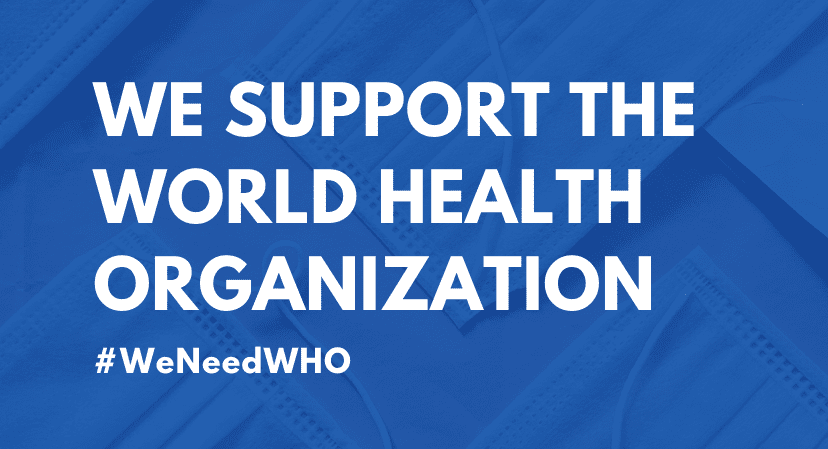The Trump Administration has sent a letter to the United Nations withdrawing the United States from the World Health Organization (WHO).
The Hunger Project, in its commitment to the global goal of ending world hunger by 2030, strongly urges the Administration to reverse this decision. We encourage our investors and followers to educate themselves on the devastating impact of this decision and learn why #WeNeedWHO.
As the link between ending hunger and the WHO may not be obvious, here are 10 reasons why the work of ending hunger needs a strong WHO:
- COVID-19 Response: The livelihoods of more than a billion of the lowest income people have been disrupted by COVID-19, leading to predictions of a doubling of acute hunger (WFP 2020). The health systems of impacted countries need support from the WHO more than ever to navigate this disaster.
- Emergencies and Protracted Conflict Situations: In recent years, and after decades of progress, the number of hungry people has been increasing primarily due to protracted conflicts in places like Syria, Yemen and Central Africa. Where governments collapse, the WHO steps in and provides essential health services. In other countries, it provides key advice on risk reduction and preparedness to prevent more hunger-causing emergencies (SOFI 2017, WHO 2020)
- 1,000 Day Nutrition: The most high-leverage single strategy for ending hunger is to ensure good nutrition for mothers from the start of their pregnancy through her child’s second birthday (Lancet 2008). Maternal nutrition is complex — in addition to adequate calories, it requires access to good nutritional advice and pre- and post-natal care. The countries where hunger persists depend heavily on the WHO to set standards based on the best science for maternal and child nutrition, and provide technical support to health ministries around the world to achieve those standards.
- Universal Health Coverage: In 2019, the UN General Assembly made a commitment to Universal Health Coverage (UNGA 2019), which is key to improving maternal and child nutrition. Without strong support from the WHO, health ministries of the world’s poorest countries lack the technical expertise to achieve this goal.
- Malaria: Malaria is strongly linked to hunger – leading to anemia and protein malnutrition (MMV 2014, NIH 2015) – and the WHO is responsible for the Global Malaria Programme.
- Child Survival: Much of the progress in reducing hunger-related deaths have been achieved due to improved breastfeeding, immunizations and treatment of water-borne disease – all activities that depend very much on WHO guidance (WHO 2019b).
- Coordinated Action: Because ending hunger requires multi-sectoral strategies, the UN agencies work together with a shared strategy. UNICEF/WHO/FAO work together to track progress in ending hunger, learning from one another and improving the efficacy and financial efficiency of life-saving interventions.
- Community Mobilization: The Hunger Project and WHO share the recognition that mobilizing community leadership is a key accelerator to both improve health and end hunger (WHO 2019). THP has worked through its leadership in the Movement for Community-led Development to strengthen that linkage. Dr. Tedros, now the WHO Director General, came to prominence for his bold investments in community health in Ethiopia.
- Social Determinants: The Hunger Project and WHO both see that deeply entrenched social conditions such as gender inequality and discrimination of marginalized groups are underlying root causes of both hunger and ill health (WHO 2019).
- US Leadership: US experts serve on the WHO Leadership Team (WHO 2020b) and US nutrition researchers have played pivotal roles in shaping the WHO’s nutrition strategies. US withdrawal from the WHO will make it much harder to bring US nutrition science to the work of ending hunger.
Please take action. Given the critical importance of health to ending hunger, The Hunger Project is a member of the Global Health Council, which provides a useful site to support you in your advocacy.

